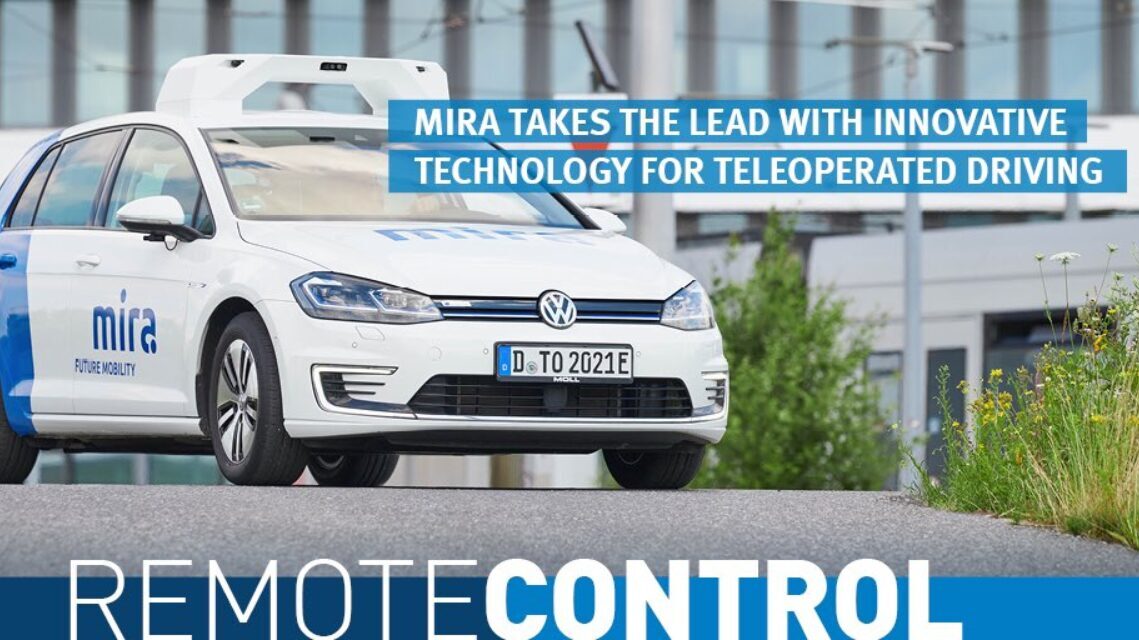The Düsseldorf-based technology group Rheinmetall is entering the world of future-oriented mobility with innovative technology for teleoperated driving.
In its newly founded subsidiary MIRA GmbH, Rheinmetall has pooled the expertise of multiple Group companies in order to make an effective, forward-looking contribution to the mobility revolution. By employing decisive technologies, MIRA GmbH is paving the way to automated driverless mobility. The Düsseldorf start-up makes this possible through teleoperation – the remote-control of vehicles on public roads. Already today, MIRA is therefore able to meet the challenges facing local public transport, logistics and industry by leveraging efficient new made-to-measure models for mobility.
Public transport options in rural areas, heavy traffic in city centres, efficient logistics – these topics are the subject of lively public debate today. For many pressing challenges, driverless mobility concepts offer an effective solution. The current state of the art in autonomous driving means that human interaction is still required in numerous “edge cases”. For the foreseeable future, dealing with such situations will continue to require a combination of human and artificial intelligence. Teleoperation supplies the technological basis for this, making it possible today to turn sustainable mobility solutions into reality.
Teleoperation boosts sustainability, efficiency, and productivity
MIRA enables the physical separation of driver and vehicle through teleoperation. This means that a vehicle can be controlled from an operator’s console anywhere. Visual information on the traffic situation, transmitted via a 4G/5G network, lets the driver operate the vehicle safely. MIRA teleoperation technology is a modular, scalable total system consisting of certified hardware and software that meets the most stringent standards for functional reliability and cybersecurity.
Key technology for numerous applications in industry and on public roads
MIRA technology lends itself to many sectors and companies that want to optimize their logistic and transport processes efficiently and safely. Applications range from the control of on-demand shuttles to summoning and returning car sharing vehicles, right through to monitoring and controlling large fleets of driverless vehicles. MIRA also offers operators of critical infrastructure and public transport companies a basis for efficiently redesigning their logistic and mobility concepts.
Teleoperation is particularly well suited to two applications in industrial settings and public space:
Teleoperation with self-driving (“autonomous”) vehicles:
The teleoperator can assist a self-driving, driverless vehicle in the event of a problem such as a system failure or if an unsolvable driving task arises, requiring the operator to take over control of the vehicle. This can take place indirectly by evaluating and approving an alternative route recommended by the vehicle or through corresponding instructions from the teleoperator. If necessary, moreover, the teleoperator can directly take over control of the vehicle, including steering, braking, and accelerating, before subsequently reverting to automatic operation.
Teleoperation therefore meets the legal requirement of technical supervision for self-driving autonomous vehicles.
Teleoperation for non-self-driving vehicles:
The teleoperator controls the vehicle the entire time directly from an operator’s stand. Already today, physical separation of the driver and vehicle can result in significantly greater driver efficiency with non-self-driving vehicles, enabling optimum operation of vehicles especially for longer distances (logistics, first mile/last mile) as well as optimized delivery of rental cars and car sharing vehicles.
Pilot project for public roads
Today MIRA already offers teleoperations technology that conforms to German traffic safety regulations for cars, trucks, and special vehicles. An initial trial for demonstrating and evaluating realistic customer models is currently taking place in the industrial port of Düsseldorf. This pilot project is being supported by district-level regulatory authorities, the City of Düsseldorf and TÜV Rheinland as technical experts. Additional operating areas are now in preparation.









